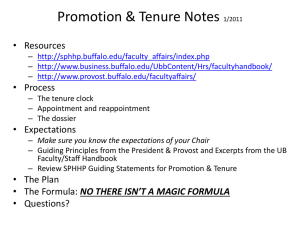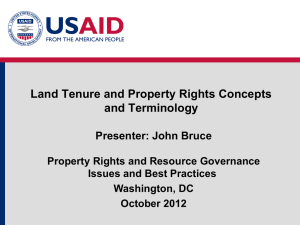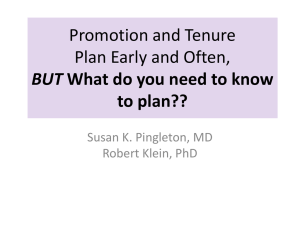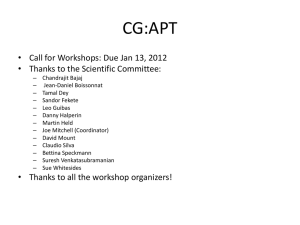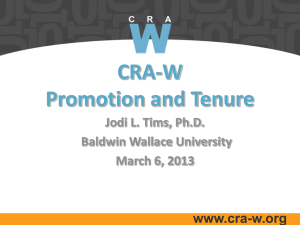Faculty Promotion Pathway - Duke University School of Medicine
advertisement
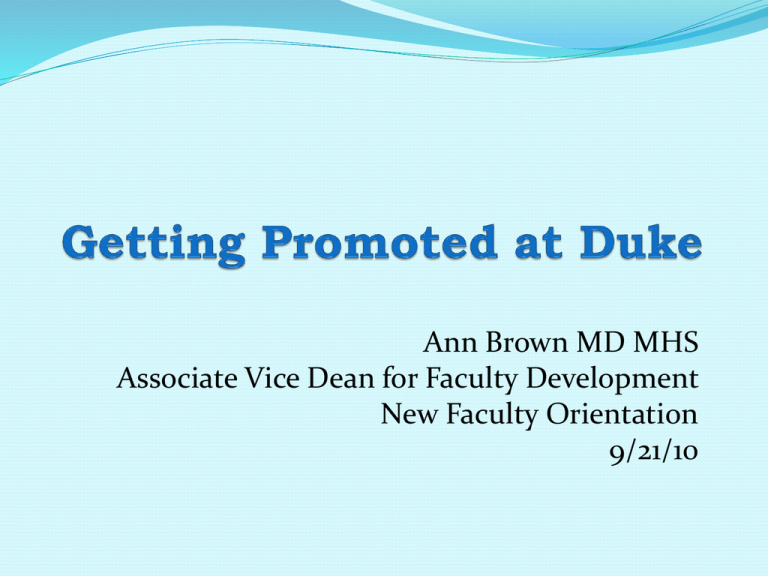
Ann Brown MD MHS Associate Vice Dean for Faculty Development New Faculty Orientation 9/21/10 Contact Office for Faculty Development 268 Baker House, Duke South Phone 684-4139 Email: brown066@mc.duke.edu Web: facdev.medschool.duke.edu View and register upcoming events See videos OR materials from past events Selected resources on professional development Outline Faculty Snapshot Promotion Process Basics Clinical and Basic Sciences Description of 5 Clinical Pathways Check bright green sheet of paper in your folder- it has your track (according to database) Basic Science Departments Immunol 14 Biochem 18 Neurobio 19 MGM 24 Pharm Canc Bio 28 Cell Bio 29 Biostatistics 45 0 10 20 30 40 50 8/31/10 Data Clinical Science Departments Derm Ortho Surg Rad Onc Optho Ob/Gyn Pathology Radiology CFM Anesthesiology Surgery Psychiatry Pediatrics Medicine 15 43 44 62 67 69 96 99 103 189 190 191 568 0 100 200 300 400 500 600 8/31/10 Data School of Medicine Faculty Clinical Basic 9% 91% Data from dFac 8/31/10 Gender Distribution by Rank Male Female 455 410 355 353 146 54 66 Medical Instructor Assistant Professor Associate Professor 72 Professor Promotion Basics Basic Science Promotion and Tenure Review Timeline About 12 months Dossier for promotion with tenure MUST be submitted by beginning of 7th year BS-APT=Basic Science APT MCEC= Medical Center Executive Committee BoT= Board of Trustees Clinical Science Promotion and Tenure Review Timeline About 12 months Dossier for promotion with tenure MUST be submitted by beginning of 10th year DAPT=Departmental APT BoT=Board of Trustees CS-APT=Clinical Sciences APT Chair notifies faculty member of DAPT recommendation What are the Ranks? Clinical Basic Medical Instructor (incubator status, tenure clock not active) Assistant Professor Assistant Professor Associate Professor Associate Professor with Tenure Professor with Tenure Professor (without tenure) Tracks 4&5 only Associate Professor with tenure Professor And others tailored to individual circumstances, not linked to tenure track What is tenure? Tenure is a promise of continued employment, absent malfeasance A specific salary is not promised For basic scientists, tenure promises full (or near full) salary For clinicians who belong to the PDC, salary guarantee is limited Tradition has been 25K Assoc Prof and 30K Full Prof For Clinical Science faculty who do not belong to PDC, tenure may have a different meaning Preparing for Promotion Request an annual review with your Chief/Chair to Assess your progress toward promotion Solicit feedback about areas to work on in coming year You should play an active role in the process of deciding when to go up for promotion You can bring this up with your Chair/Chief Things to do now Cultivate potential external evaluators APT dossier must include names of “6 individuals external to Duke University who are qualified to evaluate the candidate's scholarly contributions” (Faculty Handbook) These should not be collaborators, co-authors, mentors. Things to do now Create a Duke-formatted CV and update it periodically Faculty APT office website or call 684-3852 Develop a system for keeping track of your activities. Publications Lectures (Duke, regional, national, international) Clinical activities (and nice patient letters) Teaching activities (keep your evaluations) Service on committees (Duke, societies, NIH etc) Keep track of accomplishments (see package of folders) Files for: Committee memberships Keep a separate file for each Annual Reviews Presentation Awards/Recognitions/Kudos Publication CME Correspondence/ Networking Mentor/Advisor Activities Teaching Long term goals Privileges/Credentials Scholarly Activity (other) Promotion criteria-Basic Science see Faculty Handbook Appendix J Contributions to the field Publication record Demonstrated ability to secure funding from peer- reviewed sources Teaching Service http://www.provost.duke.edu/pdfs/fhb/FHB_App_J.pdf What are the criteria? Tenure-eligible pathways require scholarship Scholarship, research and creative activity means the systematic investigation in some field of knowledge undertaken to discover or establish facts or principles, and the scholarly effort to interpret, integrate or synthesize research findings or the preparation and execution of creative projects. Promotion Criteria-Clinical Science Criteria based on which Track you are on There are five tracks (revised 2006) Standard Tenure Clock (10 years)* 1: Clinician / Administrator / Educator 2: Clinician Researcher 3: Research focused faculty Non-clocked – term appointments 4: Clinician 5: Researcher Why have Tracks? Pathways designed to help faculty succeed within framework of institutional needs Many ways to develop a successful career at Duke Create a consistent set of expectations Provide guidance to Appointment, Promotion and Tenure (APT) Committees Guidelines Apply To… Clinical Departments MDs PhDs MD/PhDs Other terminal degree holders in the clinical departments What are the criteria? Varies with track Selection of a given track defines the promotion expectations Track 1: Clinical/Admin/Educational Track 2: Mixed Research and Clinical Track 3: Research Track 4: Clinical Track 5: Research What are the criteria? Focus Build a thread of continuity throughout your work The theme should be apparent to reviewers Be cautious of diffusion of your efforts Tenure Clock Tenure clock starts with first appointment at Assistant Professor rank regardless of track Changing Tracks Not casual- consult with chair Transfer within Tracks 1-3 relatively easier Transfer from Tracks 4, 5 to Tracks 1-3 requires Dean’s office approval due to tenure implications Path 1: Clinician / Administrator/ Educator Designed to reward physicians who see patients (typically ≥75%) and do some research, administration, or education Primary focus: publications & reputation Referral patterns National committees & professional organizations Review articles, case reports, chapters Path 1: Clinician / Administrator/ Educator Also appropriate for faculty who spend the majority of their time on a combination of clinical care, administration, and/or teaching Similar to Track 4, but difference is stronger emphasis on scholarly activity in Track 1 Path 1 Grants Clinical volumes Teaching or administrative accomplishments Tenure clock applies: must initiate tenure review by the start of 10th year Earlier review okay Path 2: Clinician / Researcher Designed to reward physicians who see patients and do ~50% research Natural home for Clinical Investigators Primary focus: publications & reputation Referral patterns National committees & professional organizations Manuscripts – high level journals Path 2 Grants Clinical volumes – lower volumes expected than on Track 1 Teaching or administrative accomplishments count but are secondary to research and clinical care expectations Path 3: Primary Research Designed for faculty who typically do ≥75% research Natural home for Lab-focused MDs and PhDs Primary focus: publications & reputation History of funding Publications Nationally significant research Path 3 Grants – Peer reviewed (NIH, Selective foundations) Publications – expect to be placed in major journals Teaching or administrative accomplishments count but are secondary to research objectives Path 4: Clinician Designed for faculty who typically do ≥75% clinical work As with Track 1, combinations of clinical work, teaching and administration also fit here Natural home for pure clinicians Primary focus: clinical care Referral patterns National committees & professional organizations - reputation Path 4 • No tenure clock But remember, if you later switch to track 1, your tenure clock started on date of first appointment to Assistant Professor in the non-tenure track Can only transfer to Tracks 1-3 during the first ten years in Path 4 Path 4 Grants – very secondary Publications – much less critical, although they enhance clinical reputation Path 5: Researcher Designed for faculty who typically do ≥80% research Natural home for PhDs in clinical departments Primary focus: publications & funding Publications – high level journals Consistent funding – annual appointments Path 5 Teaching or administrative accomplishments count but are secondary to research objectives Most teaching in the context of the research work Questions? Resources Department Administrative Liaison Faculty Liaison Faculty Handbook and APT Guidelines http://medschool.duke.edu/ Select “resources for faculty” on Left Bar Duke Advantages for Faculty http://www.provost.duke.edu/faculty/ Office for Faculty Development http://medschool.duke.edu/ APT Panel after lunch Dona Chikaraishi PhD Basic Science APT Committee Thomas Coffman MD Department of Medicine APT Committee Phyllis Leppert MD PhD Clinical Sciences APT Committee Next Panel Building a Career in Academic Medicine John Alexander MD MHS FACC Sally Kornbluth PhD Bob Lefkowitz MD
